深圳牛津版八年级上册Unit 7单元复习-学习文档
深圳牛津版八年级上册Unit 7单元复习-学习文档

八年级上册Unit 7 单元复习Memory CornerHenry, Paula and Millie write for the school newspaper. They have written the short articles below to help students improve their memory. HenryA great way to help you remember something is to imagine a picture of it _____ _____ ______(在你的脑海里). If you make the picture big, strange or ______ (可笑的), you will remember it better. ___________(例如), to remember the word “smiles”, we can imagine there is a “______ (英里)” _____ the first letter ______ (在……和……之间) the last letter. This makes it the longest word in the world. Remember: a picture is ______ (值得) a thousand words.PaulaA good method for remembering the spelling of a word is to __________ _____ ______(造一个短句)with each letter of the word. For example, if you want to remember _____ _____ ______(怎么拼写)the word “because”, you can use the sentence “B ig e lephantsc an a lways u nderstand s malle lephants.”MillieYou will forget something very quickly ______ (除非) you understand it well. For example, you may _____ _____ ______(记住……有困难)the ______ (清单) of ______ (步骤) in the ______ _____(水循环). However, it is easier to remember these steps if you understand how the water cycle works.Unit 7 重要短语❋write down 写下❋take photos 照相,拍照❋improve one’s memory提高某人的记忆力❋in one’s mind 在某人的脑海里;在某人的心目中❋for example 例如❋between ... and ... 在……和……之间❋make a sentence 造句❋far from ... 离……很远❋take a bus 乘坐公交车❋have trouble with ... 因……而苦恼❋for a short time 很短时间take out (从银行账户中)提取(款)pour out 涌出❋put ... into ... 把……放进……❋make a noise 发出噪音❋in the future 将来❋exercise one’s brain锻炼某人的大脑❋live a healthy life 过健康的生活❋have a balanced diet 均衡饮食❋get worried 担心❋slow down 变得迟钝;减速❋stay relaxed 保持放松Unit 7 知识点1. way & methodA great way to help you remember something is to imagine a picture of it in your mind.一种帮助你记忆的好方法是在你的脑海中将其想象成一幅画。
牛津译林版八年级英语上册Unit7复习课件

Lead-in: Which season do you know?
Which season do you like best?
Why ?
spring
summer
autumn
winter
思维导图
Weather and seasons
seasons
(1)_W__e_a_t_h_er
spring summer (2a)u_t_u_mn winter foggy, sunny,
Why do you like it? 表达感情在结尾。
What do you think of it?
Exploration: Verbs and sentence structures
复习句子结构
1. Subject (S) + verb (V)
主语
动词
2. Subject + linking verb + Predicative
Para 4 What do you think of the season?your feelings
Useful expressions
… is my favourite season. I always enjoy…. I love spring/summer/autumn/winter
because…. The temperature is usually…. It is often sunny/windy/rainy…. During this season, you can/can’t…. My friends and I often….
1.说出下列句子的结构
1. Many teenagers have an unhealthy diet. ( S + V + DO )
Unit7Memory复习课件牛津深圳版英语八年级上册

_u_n_l_e_s_s_y_o_u__s_t_arive there in time.
Unless it rains, the game will be played.
3.=__I_f_it__d_o_e_s_n_'_t_r_a_i_n_, the game
返回首页
第7页
Unit 7 Memory
19.关闭;切断__s_w_i_tc_h__o_f_f 20.在某人的脑海中_i_n_o_n_e_'_s_m__i_n_d_ 21.远离_b_e__fa_r__(a_w__a_y_)_f_ro_m__ 22.在……的角落__a_t _t_h_e_c_o_r_n_e_r_o_f_…__
3.Please _d_o_n_'_t leave the office _u_n_t_il_ your friend comes back. 请不要离开办公室,直到你的朋友回来。
第 17 页
Unit 7 Memory
返回首页
注意事项: 主句部分只能使用动词will的一般将来时,不能使用be going to结构。
返回首页
第6页
Unit 7 Memory
13.一次_a_t_a__t_im__e_ 14.做某事有困难_h_a_v_e__tr_o_u_b_l_e_/d_i_f_fi_c_u_lt_y__d_o_in_g__s_th_.__ 15.和……相似__b_e_s_im__i_la_r__to_…_____ 16.练习做某事_p_r_a_c_ti_s_e_d_o_i_n_g_s_t_h_._ 17.想起__th_i_n_k__o_f…__ 18.添加……到…… _a_d_d_…__t_o_…__
谈论将来可能出现的情况时, quickly.
_Unit 7重点知识梳理--牛津深圳版英语八年级上册
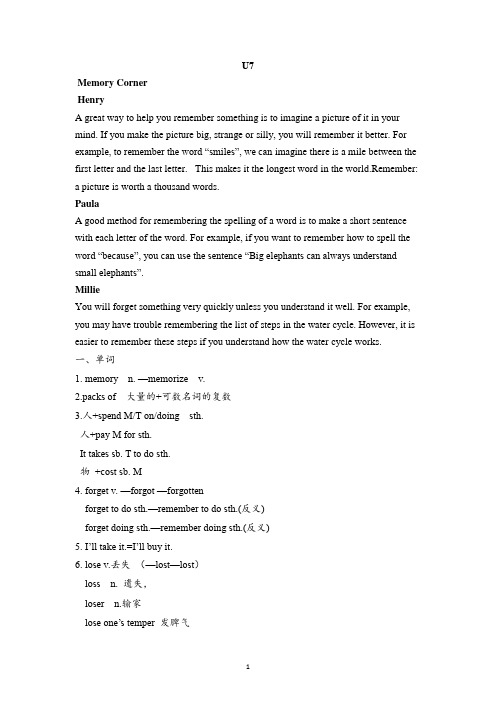
U7Memory CornerHenryA great way to help you remember something is to imagine a picture of it in your mind. If you make the picture big, strange or silly, you will remember it better. For example, to remember the word “smiles”, we can imagine there is a mile between the first letter and the last letter. This makes it the longest word in the world.Remember: a picture is worth a thousand words.PaulaA good method for remembering the spelling of a word is to make a short sentence with each letter of the word. For example, if you want to remember how to spell the word “because”, you can use the sentence “Big elephants can always understand small elephants”.MillieYou will forget something very quickly unless you understand it well. For example, you may have trouble remembering the list of steps in the water cycle. However, it is easier to remember these steps if you understand how the water cycle works.一、单词1. memory n. —memorize v.2.packs of 大量的+可数名词的复数3.人+spend M/T on/doing sth.人+pay M for sth.It takes sb. T to do sth.物+cost sb. M4. forget v. —forgot —forgottenforget to do sth.—remember to do sth.(反义)forget doing sth.—remember doing sth.(反义)5. I’ll take it.=I’ll buy it.6. lose v.丢失(—lost—lost)loss n. 遗失,loser n.输家lose one’s temper 发脾气7. enjoy doing sth. =love /like doing sth.enjoy oneself =have a good time =have fun8. write sth. down 写下=put down9. mention to do sth. 提到去做某事10. worth v. 值得be worth doing 值得做。
_牛津深圳八上期末复习系列unit7基础知识
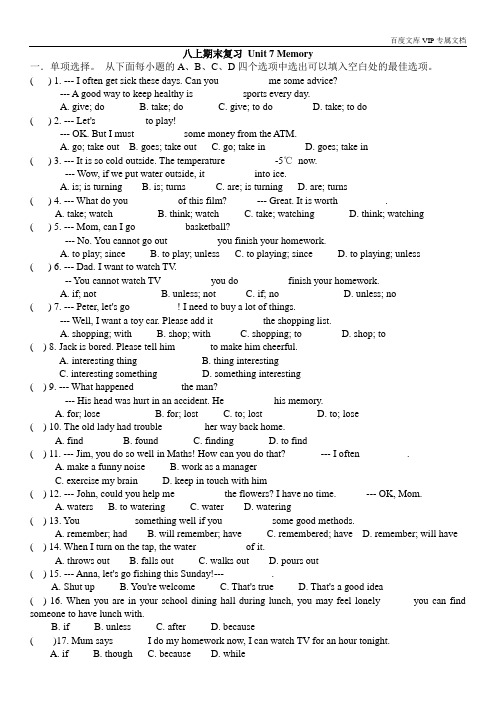
八上期末复习Unit 7 Memory一.单项选择。
从下面每小题的A、B、C、D四个选项中选出可以填入空白处的最佳选项。
( ) 1. --- I often get sick these days. Can you _________ me some advice?--- A good way to keep healthy is _________ sports every day.A. give; doB. take; doC. give; to doD. take; to do( ) 2. --- Let's _________ to play!--- OK. But I must _________ some money from the ATM.A. go; take outB. goes; take outC. go; take inD. goes; take in( ) 3. --- It is so cold outside. The temperature _________ -5℃now.--- Wow, if we put water outside, it _________ into ice.A. is; is turningB. is; turnsC. are; is turningD. are; turns( ) 4. --- What do you _________ of this film? --- Great. It is worth _________.A. take; watchB. think; watchC. take; watchingD. think; watching( ) 5. --- Mom, can I go _________ basketball?--- No. You cannot go out _________ you finish your homework.A. to play; sinceB. to play; unlessC. to playing; sinceD. to playing; unless( ) 6. --- Dad. I want to watch TV.-- You cannot watch TV _________ you do _________ finish your homework.A. if; notB. unless; notC. if; noD. unless; no( ) 7. --- Peter, let's go _________! I need to buy a lot of things.--- Well, I want a toy car. Please add it _________ the shopping list.A. shopping; withB. shop; withC. shopping; toD. shop; to( ) 8. Jack is bored. Please tell him ______ to make him cheerful.A.interesting thingB. thing interestingC. interesting somethingD. something interesting( ) 9. --- What happened _________the man?--- His head was hurt in an accident. He _________ his memory.A. for; loseB. for; lostC. to; lostD. to; lose( ) 10. The old lady had trouble________ her way back home.A. findB. foundC. findingD. to find( ) 11. --- Jim, you do so well in Maths! How can you do that? --- I often _________.A. make a funny noiseB. work as a managerC. exercise my brainD. keep in touch with him( ) 12. --- John, could you help me _________ the flowers? I have no time. --- OK, Mom.A. watersB. to wateringC. waterD. watering( ) 13. You __________ something well if you _________ some good methods.A. remember; hadB. will remember; haveC. remembered; haveD. remember; will have ( ) 14. When I turn on the tap, the water _________ of it.A. throws outB. falls outC. walks outD. pours out( ) 15. --- Anna, let's go fishing this Sunday!--- _________.A.Shut upB. You're welcomeC. That's trueD. That's a good idea( ) 16. When you are in your school dining hall during lunch, you may feel lonely______ you can find someone to have lunch with.B.if B. unlessC. afterD. because( )17. Mum says ______ I do my homework now, I can watch TV for an hour tonight.A. ifB. thoughC. becauseD. while( )18. —I wonder whether Brazil will win the match later tonight.—Go to bed first. I will wake you up as soon as the match ____.A. startsB. startedC. will startD. is starting( )19. We don't know if our friend ____. If he ____, we'll let you know.A. comes; comesB. comes; will comeC. will come; comes D .will come; come ( )20. —Dad, please tell me when Mum ____. I miss her very much.—She will return when she ____ her job done. And she will bring a nice present for you.A. returns; getsB. returns; will getC. will return; getsD. will return; will get二. 看首字母填空。
牛津深圳版英语八年级上册Unit 7 Memory 重难点知识归纳总结
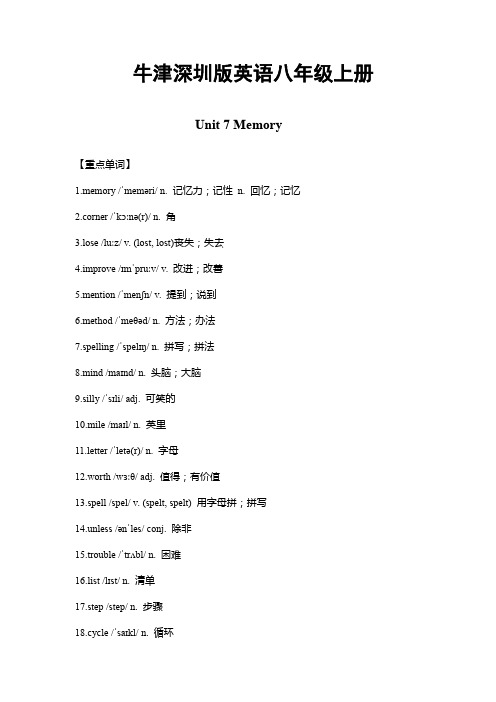
牛津深圳版英语八年级上册Unit 7 Memory【重点单词】1.memory /ˈmeməri/ n. 记忆力;记性n. 回忆;记忆2.corner /ˈkɔːnə(r)/ n. 角3.lose /luːz/ v. (lost, lost)丧失;失去4.improve /ɪmˈpruːv/ v. 改进;改善5.mention /ˈmenʃn/ v. 提到;说到6.method /ˈmeθəd/ n. 方法;办法7.spelling /ˈspelɪŋ/ n. 拼写;拼法8.mind /maɪnd/ n. 头脑;大脑9.silly /ˈsɪli/ adj. 可笑的e /maɪl/ n. 英里11.letter /ˈletə(r)/ n. 字母12.worth /wɜːθ/ adj. 值得;有价值13.spell /spel/ v. (spelt, spelt) 用字母拼;拼写14.unless /ənˈles/ conj. 除非15.trouble /ˈtrʌbl/ n. 困难16.list /lɪst/ n. 清单17.step /step/ n. 步骤18.cycle /ˈsaɪkl/ n. 循环19.similar /ˈsɪmələ(r)/ adj. 相像的;类似的20.note /nəʊt/ n. 纸币21.wallet /ˈwɒlɪt/ n. 钱包;皮夹子22.basket /ˈbɑːskɪt/ n. 篮;筐23.manager /ˈmænɪdʒə(r)/ n. (企业的)经理【重点短语】1.take out (从银行账户中)提取(款)2.pour out 涌出3.for a short time 短时间地4.in one’s mind 在某人脑海中5.switch off 关掉(开关);切断(电源)6.be late for 迟到7.have trouble doing sth. 做某事有困难8.think of 记起;想起9.a balanced diet 均衡饮食10.slow down 减速【重点句型】1.Once we learn how to ride a bike, we will never forget how to do it.一旦我们学会了如何骑自行车,我们将永远不会忘记如何骑。
牛津深圳版英语八年级上册 Unit 7-附录

t
单词 派生词 improve [v.]--improvement [n.]
lo
similar [adj.]--similarity [n.]
worth [adj.]--worthy [adj.]--worthless [adj.]
pour out 涌出 take out 取款、取出 in one’s mind 在某人脑海中 be worth doing 值得做某事 have trouble doing sth. 做某事有困难 短语 come out 出来、出版 regular exercise 规律的锻炼 daily habits 日常习惯 a balanced diet 均衡的饮食
list manager note spelling
动词 lose mention spell
单词 形容词 silly similar worth
连词
专有名词 Henry Millie Paula
unless
manage [ v. ]--manager [n.]
m
spell [v.]--spelling [n.]
Unless... 除非 Unless you work hard, you won’t succeed. (可转换为以下句型) 句型 If...not... 如 果 不 If you don’t work hard, you won’t
succeed. If 条件句 表示客观事实、自然真理等 语法 If…not... 结构 和 unless 条件句
注:加粗字体内容为四会知识
谢谢您的观看与聆听
Unit 7 Memory
附录:Unit 7【学习内容与目标】
话题 Memory 记忆力/记忆 能够使用条件句描述客观事实中事件发生的条件和必然发
2019深圳牛津版八年级上册Unit7单元复习语文

八年级上册Unit 7 单元复习Memory CornerHenry, Paula and Millie write for the school newspaper. They have written the short articles below to help students improve their memory. HenryA great way to help you remember something is to imagine a picture of it _____ _____ ______(在你的脑海里). If you make the picture big, strange or ______ (可笑的), you will remember it better. ___________(例如), to remember the word “smiles”, we can imagine there is a “______ (英里)” _____ the first letter ______ (在……和……之间) the last letter. This makes it the longest word in the world. Remember: a picture is ______ (值得) a thousand words.PaulaA good method for remembering the spelling of a word is to __________ _____ ______(造一个短句)with each letter of the word. For example, if you want to remember _____ _____ ______(怎么拼写)the word “because”, you can use the sentence “B ig e lephantsc an a lways u nderstand s malle lephants.”MillieYou will forget something very quickly ______ (除非) you understand it well. For example, you may _____ _____ ______(记住……有困难)the ______ (清单) of ______ (步骤) in the ______ _____(水循环). However, it is easier to remember these steps if you understand how the water cycle works.Unit 7 重要短语❋write down 写下❋take photos 照相,拍照❋improve one’s memory提高某人的记忆力❋in one’s mind 在某人的脑海里;在某人的心目中❋for example 例如❋between ... and ... 在……和……之间❋make a sentence 造句❋far from ... 离……很远❋take a bus 乘坐公交车❋have trouble with ... 因……而苦恼❋for a short time 很短时间take out (从银行账户中)提取(款)pour out 涌出❋put ... into ... 把……放进……❋make a noise 发出噪音❋in the future 将来❋exercise one’s brain锻炼某人的大脑❋live a healthy life 过健康的生活❋have a balanced diet 均衡饮食❋get worried 担心❋slow down 变得迟钝;减速❋stay relaxed 保持放松Unit 7 知识点1. way & methodA great way to help you remember something is to imagine a picture of it in your mind.一种帮助你记忆的好方法是在你的脑海中将其想象成一幅画。
牛津深圳版 八年级上册 Module 4 Unit 7 Memory. Revision 知识点复习
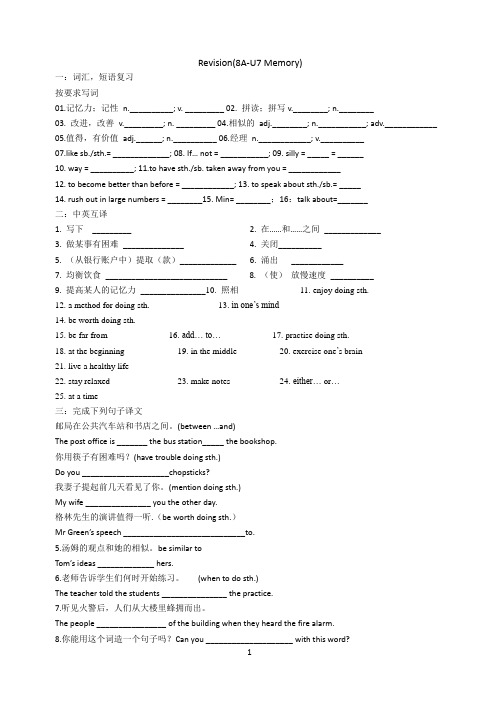
Revision(8A-U7 Memory)一:词汇,短语复习按要求写词01.记忆力;记性n.__________; v. _________ 02. 拼读;拼写v.________; n.________03. 改进,改善v._________; n. _________ 04.相似的adj.________; n.___________; adv.____________ 05.值得,有价值adj.______; n.__________ 06.经理n.____________; v.__________07.like sb./sth.= _____________; 08. If… not = ___________; 09. silly = _____ = ______10. way = __________; 11.to have sth./sb. taken away from you = ____________12. to become better than before = ____________; 13. to speak about sth./sb.= _____14. rush out in large numbers = ________15. Min= ________;16:talk about=_______二:中英互译1. 写下_________2. 在……和……之间_____________3. 做某事有困难______________4. 关闭__________5. (从银行账户中)提取(款)_____________6. 涌出____________7. 均衡饮食____________________________ 8. (使)放慢速度__________9. 提高某人的记忆力_______________10. 照相___________ 11. enjoy doing sth._____________ 12. a method for doing sth._____________ 13. in one’s mind_____________14. be worth doing sth. _______________15. be far from______________16. add… to…17. practise doing sth.________18. at the beginning 19. in the middle 20. exercise one’s brain21. live a healthy life22. stay relaxed 23. make notes 24. either… or…25. at a time三:完成下列句子译文邮局在公共汽车站和书店之间。
Unit7单元归纳(单词短语知识点))2024-2025学年牛津译林版英语八年级上册

8上Unit7单元归纳班级:_______ 姓名:_______一、词汇归纳2.词形变化(1)fog(n.雾)→__________(adj.有雾的)rain(n.雨)→__________(adj.有雨的)(2)snow(n.雪)→__________(adj.有雪的)wind(n.风)→________(adj.刮风的)(3)cloud(n.云)→__________(adj.多云的)sun(n.太阳)→________(adj.晴朗的)(4)ring(v. 给...打)→__________(v.过去式)(5)blow(v. 吹,刮)→________(v.过去式)throw(v.扔,投)→________(v.过去式)(6)shine(n.光亮)→__________(adj.光亮的)(7)sudden(adj.突然的)→__________(adv.突然地)(8)noise(n.噪声)→________(adj.嘈杂的,喧闹的)→________(adv.嘈杂地,喧闹地)(9)excite(v.使兴奋)→________(adj.感到兴奋的)→________(adj.令人兴奋的)三、句型归纳1. 我敢说你什么都不穿,看起来会很酷也会感觉很凉快。
__________________________________________________________________________ 2.随着白天变短,气温下降,农民们收割庄稼。
__________________________________________________________________________ 3.秋天是一年中最好的季节。
__________________________________________________________________________ 4.今天天气怎么样?(两种)__________________________________________________________________________ 5.打雪仗很令人激动。
牛津深圳版八年级英语上册 unit 7 Memory words

2019/9/18
• trouble • list • step • cycle • note • wallet • basket manager
29
• v. • lose improve mention spell adj. silly worth
2019/9/18
• similar • conj. • unless • phrase • take out • pour out
• 我们需要做点事情来改善环境。 • Peter must _i_m_p_r_o_v_e__his
spelling. • 彼得必须要改进他的拼写了。
2019/9/18
9
• 5. mention v 提到,说到
• How many people did he mention in this story?
2019/9/18
7
短语: lose heart 失去信心 losezxxkone’s life 学科网 丧生,死 lose one’s way 迷路 lose the game 输了一局
2019/9/18
8
• 4. improve V. 改进,改善
• We need to do something to improve our environment.
• 他在这故事里提到了多少人呢? • Don't mention it. [口语](对别人
道谢等的答复)不用客气;不用谢 ;没关系;不要紧。
2019/9/18
10
• 6. method n.方法,办法
• Have you tried the new method?
• 你试过那个新的方法了吗?
Unit+7+Memory+词汇+课件-2023-2024学年牛津深圳版英语八年级上册
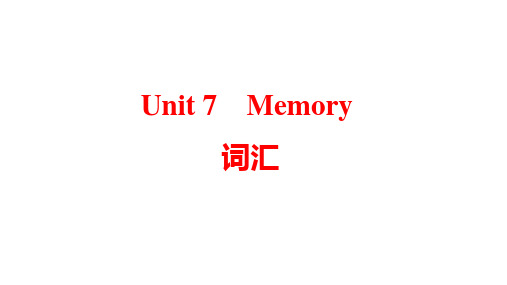
5.Our teacher is showing us a new __m_e_t_h_o_d_/_w_a_y__ (方法) of writing.I
think it is useful. 6.You will not pass the English exam _u__n_le_s_s__ (除非) you study hard from now on. 7.You may ask me for help whenever you are in __tr_o_u_b__le__ (困难). 8.Don't be _s_il_l_y_ (可笑的).A kid can't know so much about cooking. 9.If you aren't careful enough, you'll __lo__se__ (失去) something on a trip. 10.My grandpa has a good _m__e_m_o_r_y_ (记忆力).He can remember things
用improve的适当形式填空。 (3)The condition of the COVID-19 patients _i_m_p__ro_v_e_d__ after doctors' treatment. (4)The new school represents a great __im__p_r_o_v_e_m_e_n_t_.
5.trouble n.困难(不可数)
(1)We have some trouble talking about the food with our foreign teacher Alex. 我们和外教Alex谈论食物有些困难。 (2)trouble v.困扰 “What troubles you most in your Maths study?” Mum asked. 妈妈问:“数学学习中最困扰你的是什么?” (3)have trouble doing sth.= have difficulty doing sth.做某事有困难 Some students always have trouble doing their homework on their own. 一些学生总是难以做到独立完成作业。
Unit7教案讲义及练习牛津深圳版英语八年级上册

广州牛津八年级上教案讲义及练习Unit 7 Memory一、词形转换二、重点短语(单词与短语过关P108)三、重点句型(读背记)Vocabulary (1)基础识记一、根据要求写出相应的单词。
1. memory (动词)2. improve (名词)3. spelling(动词)4. manage(名词)5. imagine (名词)6. method(复数)7. lose (过去分词) 8. easy(比较级)9. write(现在分词) 10. this(复数)二、根据句意及首字母提示写单词,完成句子。
11. A good m can help us remember things faster and better.12. I won't forget anything to buy if you give me a shopping l .13. Sorry, I can't s the word unless you tell me its pronunciation14. You may ask me for help whenever you are in t .15. Tomorrow we will have a picnic near the lake u it rains.三、用括号内所给的提示词,完成句子。
16. If you want to (改善) your memory, you should eat well and sleep well.17. The first (步骤) to join the club is to apply for it.18. This book written by Shencongwen is (值得) reading again and again.19. The two pictures look (类似的).20. If you know how to read a word, it's easy for us to remember the (拼写) of the word.21. Sometimes I will go (cycle) with my parents.22. How many (mile) is it from the main square of the city to your school?23. A few (basket) of apples are in front of the door.24. The (manage) of this pany is a foreigner.25. I asked Tom not (mention) my secret.四、选出符合题意的最佳答案。
2024年牛津译林版中考英语自主复习指南八年级上册Unit7课件

A. What's up B. What's wrong C. Why me
8A Unit 7 Seasons
… is above zero; drops below zero ; … will be around …during the day and … at night ; … is in the thirties.; … rises ; drops • Views in different seasons
( B ) 6. In the sentence "Every morning, I hear the birds sing in the park", the
underlined part is
A. p
B. QC
C. IO
D. DO
( D ) 7. Please speak
to those children with hearing problems so that
A.S+V+DO
B.S+V+IO+DO C.S+V+P
D.S+V+DO+OC
( A)4.—Some say drinking coffee can cause cancer.
—Well.the risk of cancer hasn't been shown to ______ because of coffee drinking
其他短语:
8A Unit 7 Seasons
1. 什么也没穿with nothing on with 2. 充满……的 be full of / be filled
3.发高烧 have a high fever
牛津深圳版初中英语 八年级上册 Unit 7 MEmory Grammar 条件状语从句

Unit 7 Memory——条件状语从句一、词汇复习。
1.—what did you ______?—I ______ my pen.A.lost; loseB. 1ost; lostC. lose; lostD. lose; lose2.(2018江苏泰州中考)Amazing China wins high praise from the public.I think the documentary is well worth ______.A.watchB. to watchC. watchingD. watched3.(2020广州名校联盟期中A卷) We can’t play basketball outside today ______ the heavy rain.A.becauseB. whenC. because of4.(2020广州名校联盟期中A卷) —My bag is the same ______ Tom’s.—And it’s similar _____ mine.A.as; toB. to; asC. from; to5.(2019深圳宝安区期末模拟)—Kate, it’s too late. You’d better not ______ money from the bank now.—It doesn’t matter. You can go with me and there is an ATM in my building.A.pour outB. take outC. pick up6.The ______ man told us his past before he ______. His ______ made us sad.A. dead; dying; dieB. dying; died; deathC. dead; died; dyingD. dead; dying; death7. His dog ______ for two weeks, his dog's _______ makes him very sorrowful.A. has been dying; deadB. has died; deathC. was dying; dieD. has been dead; death8. The visitors are very _____ to see so many ______ changes in Wuhan.A. surprise; surprisedB. surprising, surprisedC. surprised; surprisingD. surprised , surprised9. I was never ______ to receive a _____ result from my science teacher.A. surprised; surprisedB. surprised; surprisingC. surprising; surprisedD. surprising ;surprised10. The story ______ me, that is, I am at the ______ story.A. surprise; surprising; surprisedB. surprises; surprised; surprisedC. surprise; surprised; surprisingD. surprises; surprised; surprisingif引导的条件状语从句一、If条件状语从句的构成:1. If you ask him, he will help you.↓ ↓()()2. Print the photo if you like it.↓ ↓()()If it doesn’t rain tomorrow, I will go climbing with my friends.二、If从句的位置:If you ask him, he will help you. =He will help you if you ask him.if 引导的条件状语从句既可以放在主句______,也可以放在主句_______。
Unit 7 Memory 词汇讲解 课件 2022-2023学年牛津深圳版英语八年级上册

•16. cycle n. 循环; 自行车
•The film is about the life cycle of butterflies. 这部电影是关于蝴蝶的生命周期。
•What about going for a cycle ride on Sunday? 我们星期天骑自行车去兜风如何?
17. similar adj.相似的 be similar to 与…相似 All big cities are quite similar. 所有的大城市都十分的相似。 Your idea is similar to mine. 你的观点和我的有点相似。
4. improve n. 改进,改善 (P98) (= make…better) improvement n.改进之处
We need to improve our environment. 我们需要改善环境。 Peter must improve his spelling. 彼得必须要改进他的拼写了。
13. trouble
trouble 不可数名词,前面可以用some, a lot of, any, no等来修饰。
have trouble (in) doing sth. 意为“做某事有困难”,其中,介词in可以省略.
同义词短语: have problems/difficulty doing sth 做某事有困难 have trouble /problems/difficulty with sth 在某方面有困难
Unit 7 Memory
1. Memory Corner (P99) memory n. 记忆力, 回忆 a memory for sth 对某事的记忆 memorize v (=remember) He has a good memory . 他有很好的记忆力。
Unit+7+Memory+听说+课件2023-2024学年牛津深圳版英语八年级上册

听第二段对话,回答第3—4两个问题。现在你有10秒钟的阅题时 间。 3.Where is the woman going?(Beijing./ Brazil./ Britain.) _S_h_e_i_s_g_o_i_n_g_t_o__B_r_a_z_il_._________________________________________ 4.Which match does the woman plan to watch first? (The badminton match./ The football match./ The volleyball match.) ____________________________________________________________ The volleyball match.
第二节 提问 你想了解更多关于提高记忆力的方法,请根据以下提示向老师提 两个问题。每个问题有15秒钟的准备时间和8秒钟的提问时间。 请你准备第一个问题。 11.你想知道吃什么食物可以提高记忆,你问: _W__h_a_t__c_a_n__w_e__e_a_t__to__i_m__p_r_o_v_e_o_u__r_m__e_m__o_r_y_?__/W__h_a_t__s_h_a_ll__w_e__e_a_t__to _im__p_r_o_v_e_o_u__r_m__em__o_r_y_?_________________________________________
02
听说测试
模仿朗读。 听以下短文一遍,给你50秒钟的时间准备,然后模仿朗读,当听
到“开始录音”的信号后,立即在50秒钟内朗读短文,当听到要求 “停止录音”的信号时,应立即终止朗读。请听录音。
Can you remember learning to walk or talk? A good memory is a great help in learning.Some people have a good memory, so they can easily learn things in a short time.But others can't.There are some ways to improve memory, such as getting enough sleep, eating healthy food and exercising the brain.If you want to improve your memory, have a try.
广州深圳版牛津英语八年级上_Unit_7_基础知识讲解

Unit7Memory---基础教案重点词汇1.corner n.角Write"by Airmail"in the top left-hand corner.左上角“航空邮递”。
in the corner在角落里(某范围内部);at the corner在拐角处(某范围外部)。
2.lose—lost—lost丧失,失去I lost my job when the company moved to another city.Many people lost their lives in the earthquake.【提示】动词lose还有如下的常见含义:a)表示“输掉(比赛、战斗、争论等)”。
如:His favorite football team lost the final....在决赛中失利了。
b)表示“遗失;丢失”。
如:I lost my keys.c)表示“减少;降低”。
如:The girl has lost interest in dolls.玩偶3.mention v.提到;说到 e.g.:Did she mention the time of the meeting?【提示】mention有如下的常见用法:a)don't mention it不客气(用于礼貌地回复别人的道谢)--Thank you for all your help.多谢你帮忙。
--Don't mention it.不用客气。
b)not to mention更不用说(用于强调)This is a great habitat for birds,not to mention other wildlife.这是鸟类极好的栖息地,更不用说其他野生动物了。
4.mind n.头脑;大脑All kinds of thoughts are running through my mind.我的脑海里闪现出各种念头。
- 1、下载文档前请自行甄别文档内容的完整性,平台不提供额外的编辑、内容补充、找答案等附加服务。
- 2、"仅部分预览"的文档,不可在线预览部分如存在完整性等问题,可反馈申请退款(可完整预览的文档不适用该条件!)。
- 3、如文档侵犯您的权益,请联系客服反馈,我们会尽快为您处理(人工客服工作时间:9:00-18:30)。
八年级上册Unit 7 单元复习Memory CornerHenry, Paula and Millie write for the school newspaper. They have written the short articles below to help students improve their memory. HenryA great way to help you remember something is to imagine a picture of it _____ _____ ______(在你的脑海里). If you make the picture big, strange or ______ (可笑的), you will remember it better. ___________(例如), to remember the word “smiles”, we can imagine there is a “______ (英里)” _____ the first letter ______ (在……和……之间) the last letter. This makes it the longest word in the world. Remember: a picture is ______ (值得) a thousand words.PaulaA good method for remembering the spelling of a word is to __________ _____ ______(造一个短句)with each letter of the word. For example, if you want to remember _____ _____ ______(怎么拼写)the word “because”, you can use the sentence “B ig e lephantsc an a lways u nderstand s malle lephants.”MillieYou will forget something very quickly ______ (除非) you understand it well. For example, you may _____ _____ ______(记住……有困难)the ______ (清单) of ______ (步骤) in the ______ _____(水循环). However, it is easier to remember these steps if you understand how the water cycle works.Unit 7 重要短语❋write down 写下❋take photos 照相,拍照❋improve one’s memory提高某人的记忆力❋in one’s mind 在某人的脑海里;在某人的心目中❋for example 例如❋between ... and ... 在……和……之间❋make a sentence 造句❋far from ... 离……很远❋take a bus 乘坐公交车❋have trouble with ... 因……而苦恼❋for a short time 很短时间take out (从银行账户中)提取(款)pour out 涌出❋put ... into ... 把……放进……❋make a noise 发出噪音❋in the future 将来❋exercise one’s brain锻炼某人的大脑❋live a healthy life 过健康的生活❋have a balanced diet 均衡饮食❋get worried 担心❋slow down 变得迟钝;减速❋stay relaxed 保持放松Unit 7 知识点1. way & methodA great way to help you remember something is to imagine a picture of it in your mind.一种帮助你记忆的好方法是在你的脑海中将其想象成一幅画。
A good method for remembering the spelling of a word is to make a short sentence with each letter of the word.一种记忆单词拼写的好方法就是用单词的每个字母造一个短句。
way和method均意为“方法;办法”。
注意其区别:way 是普通用语,着重个人的或具体的方式或方法,常用于in a(n) ... way 结构,意为“用……的方法/方式”。
例如:She smiled in a friendly way. 她友好地笑了笑。
method 强调系统地、有条理地办事或解决问题的方法。
例如:Miss Liu used a new teaching method.刘老师用了一种新的教学法。
2. make +n. / pron. +n.This makes it the longest word in the world.这使它成为世界上最长的单词。
make + n. / pron. + n. 意为“使……成为……”。
例如:make the classroom a happy world使课堂成为一个欢乐的世界make him our group leader 使他成为我们的组长3. worthRemember: a picture is worth a thousand words.记住:一幅图胜过一千个单词。
worth 在本句中作形容词,意为“值得;有价值”。
在句子中常用物作主语,后面常接数词或名词表示具体的价值;也常接动词的ing 形式。
常用句型有:sth be worth ... 意为“某物值……”;sth be worth doing 意为“某事值得做”。
例如:This house is worth 1,000,000 yuan. 这幢房子值一百万元。
The film is worth seeing. 这部电影值得一看。
4. unlessYou will forget something very quickly unless you understand itwell.你很快就会忘记某些东西,除非你充分理解了它。
unless 用作连词,意为“除非;如果不”。
一般情况下可与if ... not 互换使用,用来引导条件状语从句。
unless 引导的条件句,主句的时态和从句的时态通常也要遵循“主将从现”的规律。
例如:I won’t go to the party unless he invites me.= I won’t go to the party if he doesn’t invite me.除非他邀请我,否则我就不去参加聚会。
5. have trouble (in) doing sthFor example, you may have trouble remembering the list of steps in the water cycle.例如,你也许在记忆水循环的步骤方面有困难。
have trouble (in) doing sth 意为“在做某事方面有困难”,其中介词in 可以省略。
此结构与have difficulty / problems (in) doing sth 意思相近。
“在做某事方面没有困难”一般用have no trouble /difficulty / problem (in) doing sth来表示。
例如:Some students have trouble / difficulty / problems (in) studying English.有些学生在学习英语方面有困难。
These students have no trouble / difficulty / problem (in)studying English.这些学生在学习英语方面没有困难。
noteFive $100 notes came out.出来了五张一百美元的纸币。
note 作名词时,意为“纸币;便条;笔记;注解”。
它还可以作动词,意为“注意;记录”。
例如:Please make a note of the dates.请记下日期。
I’ve noted the dates in my diary.我已经在日记本上记下了日期。
1. 不定代词+形容词You can try to memorize something new.你可以尽力去记忆新的事物。
something 是不定代词,意为“某事;某物”。
当形容词修饰something 等不定代词时,要放在不定代词的后面。
例如:There is something wrong with my car.我的车有点毛病。
Is there anything interesting in the newspaper?报纸上有什么有趣的事吗?2. relaxIf you want your brain to work well, you also need to relax.如果你想脑子好使,你也需要放松。
relax 是动词,意为“使放松;使轻松”。
其形容词形式有两种:relaxed 和relaxing.relaxed 意为“(感到)轻松的、自在的”,常用来修饰表示人的名词或代词。
relaxing 意为“(使人)放松的、自在的”,通常用来修饰表示事物的名词或代词。
例如:Doing something that you enjoy can relax yourself.做你喜欢的事可以使你自己放松。
I felt relaxed after finishing everything.一切都完成后,我感到一身轻松。
The film is relaxing.这部电影令人放松。
Unit7 语法A. 条件状语从句一、在复合句中,由从句表示的状语叫状语从句。
由if 或unless 引导的状语从句叫条件状语从句。
例如:If I get up early tomorrow morning, I will call you.如果明天早上我起得早,我就会给你打电话。
句中“明天早上我起得早”是“我就会给你打电话”的一个条件,所以这里的“If I get up early tomorrow morning”就是条件状语从句,而“I will call you”是这个句子的主句。
